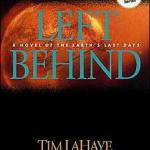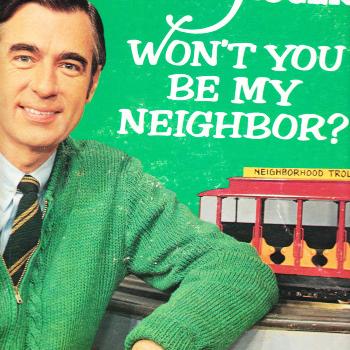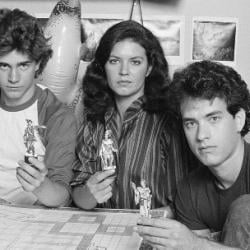This seems urgently relevant again. Still. Always. So here is a post from 2016 about a famous “thought experiment” that is no longer only that.
I want to talk about a thought experiment, but before we do that, we need to talk about what a thought experiment is — and what it isn’t.
It’s not a debate tactic. Or an argument. The point of this exercise isn’t for Person A to try to convince Person B to change how they think. The point, rather, is to allow both of them to explore what they already think — to perhaps reveal what they think.
Or we might say, to explore and reveal what they feel. So-called “thought experiments” can function as a kind of gut-check. Or heart-check. Or conscience check.
And conscience is really what we’re talking about here. Not “feelings” as irrational emotion, but underlying moral sentiments. These are often inarticulate and unarticulated even to ourselves. They can be like the “check engine” light on a car’s dashboard. It tells us something is amiss, but is unhappily unspecific about what that might be.
And but so, the point of revisiting this well-known thought experiment here is not to argue, debate or persuade. It’s not about taking sides but about watching ourselves respond so that we can try to get a better handle on what it is that does or does not trouble our conscience, a better sense of the alignment between head and heart. A gut-check.
This particular thought experiment is really just a variation of a trolley problem. Ethics professors, logicians, and philosophers love trolley problems, but that’s not where I first encountered them. I first encountered them thanks to evangelical preachers teaching us about penal substitutionary atonement — about Jesus dying in our place as a ransom for our sins. This was often presented as a kind of divine, cosmic trolley problem, with Jesus trapped on one set of tracks and the rest of us (or, at least, a handful of the elect) trapped on the other set, and God the Father there at the switch.

But this variation doesn’t involve tracks or trolleys or trains at all.
This one involves a fire in a fertility clinic.
OK, then. …
So there’s a fire in a fertility clinic. You run to the back to make sure everyone is out and you find the room engulfed in flames. You’ve got to go — now — before the ceiling collapses and escape becomes impossible. But as you turn to go, you see two things. There’s a young girl, about 6 or 7 years old, passed out on the floor. And there’s a small freezer unit, inside of which there’s a rack holding two dozen frozen embryos. You have just barely enough time, maybe, to carry one or the other out with you.
But only one. You can save the little girl, or you can save the 24 embryos.
Which do you choose to save?
Me too.
I say “Me too,” there, because I’m assuming you choose to save the little girl. Everybody does. That’s what our guts say, what our hearts say, what our conscience screams. That’s our moral intuition — what we feel would be right.
And to choose the other option — to leave the girl in order to “rescue” the 24 embryos — violates that moral intuition. It strikes us as wrong. As very wrong.
But that’s just the first level of what this little exercise can show us about what’s going on down there in our guts or hearts or souls or consciences or however we describe it.
Because if, like me, you were long taught and trained to affirm that human personhood begins at the moment of conception, and that a fertilized egg is morally indistinguishable from an infant, a toddler, a teenager or you, yourself, then this initial reaction — the one you just had, and felt, and knew with apparent clarity — is unacceptable. It’s what you feel, but it’s not something you’re allowed to feel.
And so that first response — that powerful and obvious and certain response to save the little girl — now seems like a trap. It seems like some devious, wicked invention formulated to trick you into feeling something you’re not supposed to feel. It seems like a trap intended to trick you into feeling something you’re not allowed to feel.
But, again, let me repeat: This is not a debate or an argument. I am not trying to change your mind, only to ask you to consider what was already there, already present. The point is not to trick you or to trap you into wanting to rescue this hypothetical little girl, but only to show that you — like me, like everyone else — already wanted that.
If this exercise makes you feel tricked or trapped, that’s not the consequence of anyone sneakily coercing you into feeling that rescuing the little girl is the right thing to do. That defensiveness arises, rather, from the sense that this feeling, this moral intuition, is not allowed.
If you do feel trapped, you may be tempted to start mapping out some clever evasion. Or you may switch tabs and start Googling for “rebuttals” of this famous scenario. You’ll find them — lots of them. Some involve some arcane, jesuitical arguments that go on for thousands of words. Others elude the point by deconstructing and reconfiguring the scenario as a magic trolley. Others just say you should stop talking to anyone who talks about such things. But all of them are frustratingly unsatisfying because they’re not addressing the thing that would cause you to look for such responses. They’re all focused on “Here is how you should counter this argument in a debate” rather than what you’re really searching for here. “Why do I feel like saving the little girl was the right thing to do? Why do I feel like leaving the girl and saving the 24 embryos instead would be monstrous?”
Because that’s what you do feel. We all do — which is why we almost never even bother considering that this thought experiment offers a third option. You could just turn and run, saving only yourself and fleeing the fire without either the girl or the embryos.
We don’t pay much attention to that possibility because we already know — universally, unanimously — that it isn’t an option at all. It would be cowardly, despicable, monstrous. The idea of emerging empty-handed from the building is almost unthinkable. How could you possibly justify yourself or defend yourself if you did that and had to somehow explain that decision to those outside?
But I’m not sure it’s any easier to imagine such an explanation if you emerged carrying the tray of embryos. No amount of reasserting the belief that these embryos are fully human persons would seem adequate at that point, even if the only people gathered outside were those who zealously shared that perspective. They might agree with the choice on some abstract level, doing their best to squelch the horror rising in their gut as they attempted to hail you as the hero who rescued 24 “people” from a burning building, rather than regarding you as someone who just left a little girl to die.
But no matter how many times they and you repeated that, you’d all still be feeling something else.
Maybe that feeling — that moral intuition, that pang of conscience — is just some emotional, sentimental response that a more sophisticated moral construct requires us to see past. Maybe that pang of conscience doesn’t mean anything.
Or maybe it means a great deal, whether or not it’s “allowed.”













